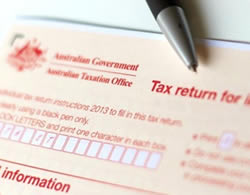Lucia Stein* says there are some tips and tricks to saving time and money on your tax return.
 It’s the start of a new financial year and that means it’s time to start thinking about your taxes.
It’s the start of a new financial year and that means it’s time to start thinking about your taxes.
Do you put aside time each week during the year to keep a record of your receipts or remember to claim for something most people forget?
What are some common claims people forget about?
According to accountant Rebecca Morgan, one of the big items people miss is income protection insurance — not life insurance, but the component related to their income.
The insurance, also known as salary continuance, is meant to help you manage your expenses if you are unable to work for a certain period if you are sick or injured.
Another common claim that people might miss is for donations you’ve made in the past financial year.
“People forget to claim for donations but it’s important to keep track of your receipts because it’s fully deductible,” Ms Morgan said.
And the other big one is the fees paid to a tax agent for the previous year’s tax return.
ATO Assistant Commissioner, Karen Foat says there is no such thing as a standard claim.
“Even if your co-workers make a claim, you can only make a similar claim if you meet the three golden rules,” Ms Foat said.
So keep in mind:
- You must have spent the money yourself and weren’t reimbursed.
- It must be directly related to earning your income.
- You must have a record to prove it.
Working from home
These days a lot of people work from home.
Ms Morgan said you could claim 52 cents per hour (it used to be 45 cents) that you work from home and that covered your utility costs and depreciation on office furniture.
“That simplifies things as long as you keep a diary of how many hours you’ve used your office, so at the end of the year you’ve got a record and you can apply it against that rate,” she said.
You can claim for self-education or reading up for your job
If you’re doing independent study or self-education related to your current job, you can claim some expenses associated with it as long as:
- It maintains or improves your employment skills or you’re learning something related to your job.
- It results in an increase in your income from your current employer.
Those expenses can include things like course fees, student union fees, textbooks, stationery, internet, home office expenses, professional journals and some travel.
You can even claim for the cost of travel to and from your place of study, although that may have to be apportioned.
And don’t forget to claim if you’ve had to attend seminars or conferences for work.
The cents-per-kilometre rate for work travel has gone up
Ms Morgan said it was important to remember home-to-work travel was not deductible.
“But if … you’re going to an alternative place of work, you can claim for that and any associated parking,” she said.
“If there are any overnight trips for travel, you can claim deductibles for your travel costs and obviously food costs as well.”
And if you’re using your own car for work travel, you have two options.
One is adopting the cents-per-kilometre rate, which has increased from 66 cents per kilometre to 68 cents.
“All people need to do is keep evidence, whether it’s in the form of diary records or if they take regular trips, a reasonable calculation of what kilometres they did, and that’s just capped at 5,000 km if you’re using the cents method,” Ms Morgan said.
The other method is by keeping track of all your expenses and using a logbook.
According to the Australian Taxation Office (ATO), keeping a poor record of receipts can cost you at tax time.
“Too often we see taxpayers bring in a shoebox full of receipts to prove a claim, but often the receipt has been lost or is too faded to provide proof of purchase,” Ms Foat said.
“And unfortunately, a credit card statement will usually not have enough detail to support a claim.”
But Ms Morgan said you can keep them all electronically.
“There are a number of apps where you can take a photo of your invoice and it keeps a record of it for you; even the ATO has their own app which helps you keep your records in order.”
Should you use an accountant or do it yourself?
Does seeing an accountant really make you better off?
Ms Morgan said there were benefits to both.
“I guess what an accountant can do for a worker is that they can identify all the claims and also identify all these tax offsets they’re entitled to,” she said.
“And because whatever you pay them can be tax deductible, the cost can be pretty reasonable because it’s offset.”
On the other hand, if you’ve done your research and you’re convinced you can’t claim any deductions, you can fill out your tax return online.
“But if you’re unsure of what your deductions are or what you need to prove your deductions … an agent can give you the confidence on what you can claim and what you need to provide if there is a tax audit,” Ms Morgan said.
And have you updated your details with your employer?
Employers have to withhold tax from your payments, which is based on whatever information you provide to them, including your withholding declaration.
So, it’s up to you to let your employer know if your situation has changed.
About 7.5 million employees can check their year-to-date pay, tax and super information online through their ATO Online account on the mygov website.
It might look a little different to how you’ve previously done your taxes, as this time you’ll see an end-of-year income statement (instead of a payment summary from your employer).
You’ll be able to check in to see these amounts throughout the year.
* Lucia Stein is a digital producer at ABC National News Online. She tweets at @luciastein_.
This article first appeared at www.abc.net.au.











